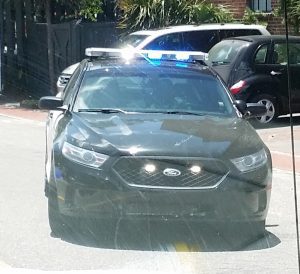 Traffic stops are stressful and anxiety producing. Especially these days. So here are some traffic stop guidelines to let you know what to do to make sure it goes as smoothly as possible. The main thing to remember about a traffic stop is to show consideration for officer safety. After all, the police officer doesn’t know you. Furthermore, they do not know whether you are dangerous. And they are trained to be on guard when making any police stop. You can make the interaction easier for them, and safer for you, by observing a few common sense rules.
Traffic stops are stressful and anxiety producing. Especially these days. So here are some traffic stop guidelines to let you know what to do to make sure it goes as smoothly as possible. The main thing to remember about a traffic stop is to show consideration for officer safety. After all, the police officer doesn’t know you. Furthermore, they do not know whether you are dangerous. And they are trained to be on guard when making any police stop. You can make the interaction easier for them, and safer for you, by observing a few common sense rules.
Traffic Stop Guidelines
You look up in the mirror to see blue lights behind you. What do you do? If you stopped, pull over safely to the side of the road as soon as practicable. Hence, where you should pull over depends on the surrounding environment. In some cases you may pull off to the side of the road. But in other situations, you may have to keep going briefly to turn onto a side street.
If you are being pulled over at night on a street which is dark and remote, you may be justified in waiting to pull over until you come to a well lit area. If you feel uncomfortable pulling over, put on your hazard lights or blinker to let the officer know that you are going to pull over, and slow down. Most officers understand that you are simply trying to get to a location that is safe to pull over.
Keep Your Hands Visible
First or all, once stopped, keep your hands visible to the officer at all times. Hence, it is a good idea is to keep your hands on the steering wheel until instructed to produce your license and registration. If your registration is in the glove compartment or in the center console, ask for permission to get it. Reaching for the glovebox without informing the officer will make police nervous. And if you are a concealed carry (CWP) license holder, inform the officer immediately. In addition, also tell the officer if there is a gun in the car but do not reach for it. Bad things can happen here quickly.
Interaction with Police
When interacting with the officer, move slowly and carefully. Quick or jerky movements make officers nervous. So when stopped by police, remain as calm as possible if you can. Answer their questions and comply with their requests. Furthermore, it is not helpful to argue with an officer on the street. Here, we want to get through the traffic stop as quickly and problem free as possible.
If there is a legitimate problem with the stop, we will address it in court. For now, you should comply with all directions of the officer. And be as polite as possible. Rather, if a officer is unprofessional or abusive, we can report this to the law enforcement agency. Later. But only after you get home. Do not argue at the curb. That’s what we do for a living. Let us handle this situation at the proper time.
Be Courteous and Use Common Sense
While these are some standard traffic stop guidelines, we did not cover every scenario. Instead, the best advice is to be courteous and use your common sense. Police are there to do their job. And that job is to protect us. The vast majority of police officers do their best in a seemingly thankless environment. We can help them and ourselves if we simply do our part. For more information about legal issues with traffic stops, click here. You can also contact our law firm for more answers. Call now.
